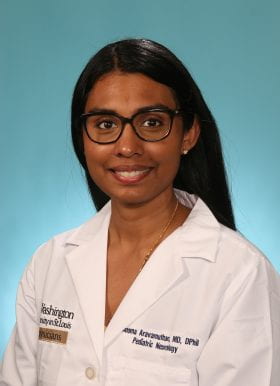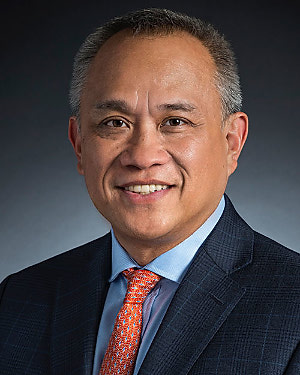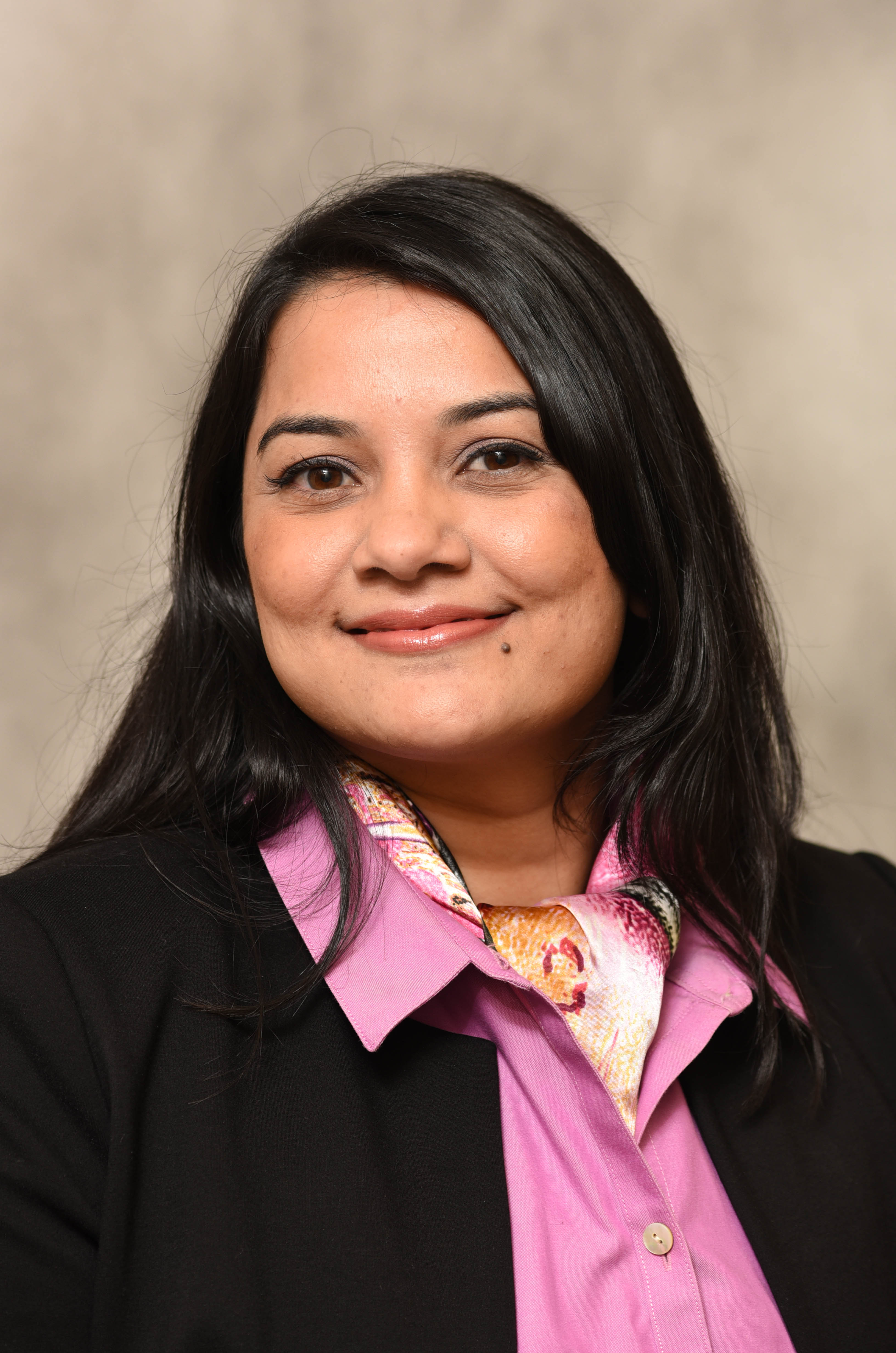 Bhooma R. Aravamuthan, MD, DPhil
Bhooma R. Aravamuthan, MD, DPhil
Dr. Bhooma Aravamuthan is an Assistant Professor of Neurology, pediatric movement disorders specialist, and neuroscientist studying dystonia in cerebral palsy (CP). She obtained her MD at Washington University School of Medicine through the Medical Scientist Training Program and her DPhil in neuroscience through the University of Oxford in the UK and the National Institutes of Health as a George C. Marshall Scholar and an NIH Graduate Partnerships Program Scholar.
Following pediatrics residency training at St. Louis Children’s Hospital, she completed a residency in pediatric neurology at Boston Children’s Hospital and movement disorders fellowship at Boston Children’s Hospital and Massachusetts General Hospital in Boston, MA. She joined the faculty at Wash U in 2018.
Aravamuthan specializes in CP both clinically and in the lab, and specifically focuses on understanding the pathophysiology of dystonia in cerebral palsy. Her translational research includes assessment of practitioner and community views on CP and dystonia diagnosis, optimization of dystonia diagnosis in CP both clinically and in animal models, development of clinically-relevant mouse models of CP, and systems and circuit neuroscience approaches to assess dystonia pathophysiology in mice. She holds numerous national leadership positions including as Vice Chair of the American Academy of Neurology Section on Intellectual and Developmental Disabilities, Leader and Steering Group Member of the Cerebral Palsy Research Network Committees on Dystonia Quality Improvement and Dystonia Research, and Co-founder and Co-director of the Child Neurology Society Cerebral Palsy Special Interest Group.
 Felicia Chow, MD, MAS
Felicia Chow, MD, MAS
Dr. Felicia Chow is a neuro-infectious diseases clinician-researcher who works at the crossroads of neurology, infectious diseases, and global health. Dr. Chow’s research is focused on (1) predictors, patterns, and mechanisms of infection-related stroke, (2) sex and race disparities in cerebrovascular risk in HIV infection, and (3) treatment strategies for neurotuberculosis. Her current work examines intervenable drivers of sex differences in HIV-associated cerebrovascular injury and cognitive impairment and how to identify individuals who may respond best to treatments targeting these drivers. In addition, Dr. Chow leads clinical trials investigating new regimens to improve mortality and neurologic outcomes in neurotuberculosis.
As part of this work, Dr. Chow has championed greater diversity in research training and is committed to mentoring junior investigators in neuro-infectious diseases and clinical research methods. She directs the UCSF Neuro-Infectious Diseases Clinic where she cares for patients with a wide range of neurological infections and regularly consults on challenging neuro-infectious diseases cases locally, statewide and nationally, including as part of the California CNS TB Expert Network.
 Romergryko G. Geocadin, MD, FANA
Romergryko G. Geocadin, MD, FANA
Dr. Romergryko G. Geocadin is a professor of neurology, of neurosurgery and of anesthesiology and critical care medicine at the Johns Hopkins University School of Medicine. He holds a joint appointment in medicine. He completed his medical education in the Philippines, residency at NYU and fellowship at Johns Hopkins, and now specializes in neurocritical care medicine at Johns Hopkins. Presently, he is the chairman of the multidisciplinary critical care practice committee at Johns Hopkins Bayview and co-director of the Johns Hopkins Encephalitis Center. Previously, he was director of the Neurosciences Critical Care Unit at Johns Hopkins Bayview and director of the Division of Neurosciences Critical Care at Johns Hopkins.
As a member of the Science Committee of the Emergency Cardiovascular Care Committee of the American Heart Association (AHA) and the Adult Research Task Force of the Get with the Guidelines Resuscitation, he has published several AHA statements, guidelines and high-impact scientific articles related to cardiac arrest resuscitation. Dr. Geocadin was a panelist and speaker for the Institute of Medicine (IOM) of the National Academy of Sciences Committee on Treatment of Cardiac Arrest: Current Status and Future Directions. He is chair of the practice guidelines writing group on Brain Injury and Cardiac Arrest for the American Academy of Neurology. Dr. Geocadin has published extensively in peer-reviewed journals, and he serves on the editorial boards of Resuscitation, Neurocritical Care, Seminars in Neurology, and Critical Care Practice and Research. He was guest editor for Neurology Clinics, Critical Care Clinics, and Emergency Medicine Clinics of North America.
He has been elected fellow of the American Academy of Neurology, American Neurological Association and the Neurocritical Care Society. He is the past president of the Neurocritical Care Society (NCS) and the chairman of the 2014 Annual Meeting of the NCS.
 Ming Guo, MD, PhD, FANA
Ming Guo, MD, PhD, FANA
Ming Guo, MD, PhD, is P. Gene & Elaine Smith Chair in Alzheimer’s Disease Research and Professor at UCLA Department of Neurology, Molecular and Medical Pharmacology. As a practicing Neurologist, she sees patients with memory disorders, neurodegenerative and neurogenetic disorders, referred from both domestic and international sources. As a researcher, her lab investigates molecular mechanisms of the two most common neurodegenerative disorders, Alzheimers and Parkinsons disease. Mutations in PINK1 and PARKIN lead to inherited forms of Parkinsons disease. Her lab is one of the first two labs worldwide to report the function of PINK1, and to discover that PINK1, a mitochondria-localized serine-threonine kinase, and PARKIN, an E3 ubiquitin ligase, act in a common genetic pathway to regulate mitochondrial integrity and mitochondrial quality control. Her work has wide-range implications for controlling processes in aging, and other aging-related diseases including other neurodegenerative disorders, heart disease and metabolic disorders.
Dr. Guo is an elected member of the American Neurological Association (ANA), and has received many awards. She is an Alfred P. Sloan Foundation fellow, a McKnight Neuroscience Foundation Brain Disorder Awardee, an Ellison Medical Foundation Senior Scholar in Aging, a Klingenstein-Simons Fellow in Neuroscience, and the Klingenstein-Simon Foundation Robert H. Ebert Clinical Scholar. Her work is also supported by the National Institute of Health (NIH) EUREKA (Exceptional Unconventional Research Enabling Knowledge Acceleration) award. In addition, she was selected to receive the ANA Derek Denny Brown Neurological Scholar Award that is given to one or two awardees each year, and the John Walsh Young Investigator Award, which is given to one Assistant or Associate professor every three years for their research creativity at UCLA. Dr. Guo is actively involved in community service. She is Chair of the Board of Scientific Counselors at the National Institute of Neurological Disorders and Stroke (NIH/NINDS). She also serves as a member of a Blue Ribbon Panel for the NIH/NINDS, the ANA Scientific Program Advisory Committee, the Society of Neuroscience Program Committee, and the Scientific Advisory Committee of the A.P. Giannini Foundation in California.
 Jun Li, MD, PhD, FANA
Jun Li, MD, PhD, FANA
Dr. Jun Li serves as Chairman of the Stanley H. Appel Department of Neurology at the Houston Methodist Neurological Institute, effective June 1, 2022. Dr. Li most recently served as the Chairman of the Department of Neurology, the Scientific Director of Translational Neuroscience Initiatives at Wayne State University, and the Specialist-in-Chief of Neurology at the Detroit Medical Center. Dr. Li spent nine years of his junior faculty career at WSU and another nine years at Vanderbilt University before taking on the chairman position at WSU. Dr. Li received his medical degree from Anhui Medical University in the People’s Republic of China in 1985. He received his doctoral degree in Neurosciences in 1995 from the Drexel University College of Medicine (formerly Hahnemann University). He completed a Neurology residency in 1999 at the Ohio State University; and an EMG/Neuromuscular Fellowship in 2000 in the Department of Neurology at the University of Utah.
As a physician-scientist, Dr. Li subspecializes in peripheral nerve diseases and myelin biology. His laboratory has been continuously funded by NIH since 2004. He has published more than 90 articles in peer-reviewed journals and book chapters. These contributions earned him a Wolfe Research Prize from American Neurological Association in 2014. He is a current member of the ANA Board of Directors and has also served as a member of the Scientific Advisory Board for the Muscular Dystrophy Association, Charcot-Marie-Tooth Association, and the scientific committee of the Peripheral Nerve Society. He has been a member of NIH study sections for more than a decade.
Dr. Jun Li's research has two arms – basic science studies in laboratory and clinical research. The basic science research focuses on a better understanding of how myelinating Schwann cells interact with axons and how various genetic mutations in inherited peripheral nerve diseases (or Charcot-Marie-Tooth diseases) alter the molecular signaling between the two types of cells. These studies aim to identify molecular targets for developing therapeutic interventions. His clinical studies examine a group of inherited peripheral nerve diseases that typically result in limb muscle weakness, sensory loss, and foot deformities in these patients. Dr. Li directs a CMT clinic that is specifically designated for patients with inherited peripheral nerve diseases. This multi-disciplinary clinic occurs weekly and sees patients from throughout the United States. His research team is interested in the genotype/phenotype of these diseases, the identification of novel genetic mutations causing the diseases, translating the laboratory findings to bedside practice, and developing biomarkers to monitor disease progression.
 Uma Menon, MD, MBA, FACNS, FAES, FAAN, FANA
Uma Menon, MD, MBA, FACNS, FAES, FAAN, FANA
Dr. Uma Menon is a board-certified Neurologist and Epileptologist who joined Morehouse School of Medicine as an Associate Professor and Chief of Neurology on September 1, 2021. Dr. Menon completed her medical training in India, followed by residency in Internal Medicine from Jamaica (West Indies), and residency in Neurology (2009) from Louisiana State University Health Sciences Center, Shreveport. This was followed by a Fellowship in Neurophysiology (Cleveland Clinic, Ohio; 2010) and Fellowship in Epilepsy (Yale University; 2016). Dr. Menon worked at Tulane University, New Orleans, during 2010-2013 as the Neurology Residency training program director. She moved to Washington, DC, in 2013, and obtained an MBA in Healthcare from George Washington University. She returned to New Orleans in 2016 and worked at Ochsner Medical Center until she joined Morehouse School of Medicine. Dr. Menon was awarded ‘Fellow’ status by the American Epilepsy Society (2017), American Clinical Neurophysiology Society (2017), American Academy of Neurology (2022) and American Neurological Association (2022).
Dr. Menon has been involved in teaching throughout her career and has published extensively and presented at several national and international meetings. She is an ardent patient and physician advocate and routinely participates in educational forums for professionals, patients and general public.
Dr. Menon also volunteers in committees of several national and international professional societies and epilepsy patient support groups. Some of her roles include: Chair of the Education about Racism and Discrimination workgroup of the IDEAS (Inclusion, Diversity, Equity, Anti-racism, Social justice) task force of the ANA (American Neurological Association), Vice-Chair of Ethics section of AAN (American Academy of Neurology), Member of the Budget Review Committee of ILAE (International League Against Epilepsy) Dr. Menon is also the inaugural Neurology Residency training program director (2023) at
Morehouse School of Medicine as she continues her work on ethics, advocacy, equity and
antiracism in Neurology and medicine.
 Avindra Nath, MD, FANA
Avindra Nath, MD, FANA
Dr. Nath is the Clinical Director of the National Institute of Neurological Disorders and Stroke (NINDS) at NIH, where he is also Chief of the Section of Infections of the Nervous System, Director of the Translational Center for Neurological Sciences. He has held these positions since 2011. Prior to this he was Professor of Neurology and Director of the Division of Neuroimmunology and Neuroinfectious Diseases at Johns Hopkins University (2002-11). He held faculty positions at the University of Manitoba (1990-97) and the University of Kentucky (1997-02). Dr. Nath received his MD degree from Christian Medical College in India in 1981and completed a residency in Neurology from University of Texas Health Science Center in Houston, followed by a fellowship in Multiple Sclerosis and Neurovirology at the same institution and then a fellowship in Neuro-AIDS at NINDS. He specializes in neuro-immunology and neurovirology. His research is focused on studying the clinical manifestations and pathophysiology and developing treatments for neurological infections with a focus on HIV infection and endogenous retroviruses. In recent years, he has studied the neurological complications of emerging infections including Ebola, Zika virus and SARS-CoV-2 and conducts research on patients with undiagnosed neuroinflammatory disorders.
He has served on advisory committees to the NIH, CDC, FDA and WHO. He is the past President and the recipient of the Pioneer award from the International Society of NeuroVirology. He received the Wybran award from the Society of Neuroimmune Pharmacology for contributions to Neurovirology. He also received the NIH Director’s award for his work on SARS-CoV-2 and the Health and Human Services Secretary’s award for his work on Ebola infection. He is an elected member of the Association of American Physicians, an elected Fellow of the American Association for the Advancement of Science and a Board member of the American Neurological Association.
 Christa O’Hana S. Nobleza, MD, MSC
Christa O’Hana S. Nobleza, MD, MSC
Dr. Christa O’Hana S. Nobleza, MD, MSCI, is an Associate Professor of Neurology. She received her degree in Doctor of Medicine in the University of the East Ramon Magsaysay Memorial Medical Center after achieving a Bachelor of Science in Physical Therapy from the University of the Philippines College of Allied Medical Professions. She then proceeded to undergo preliminary internal medicine Internship and Neurology residency in University of Connecticut. She finished her Neurocritical Care Fellowship in Johns Hopkins University. She was the Quality officer, the Neurocritical Care Fellowship director, Student Interest Group in Neurology faculty advisor and the Neuroscience Intensive Care Unit Medical Director and Division head for the Department of Neurology in University of Mississippi Medical Center. She is currently the Medical Director of the Baptist Medical Group and Baptist Memorial Hospital Neurocritical Care Service in Memphis, Tennessee and currently is an Associate Professor of Neurology in University of Tennessee Health Science Center. Her interest lies in improving the Neurocritical care continuum of care through quality improvement initiatives, simulation science, innovation and technology incorporation, creation of clinical protocols and leading educational initiatives for the NCC multidisciplinary team. Her advocacy is centered in empowering women and underrepresented in medicine especially in neurology and neurocritical care and improving diversity in medicine. She currently holds several leadership positions in both Neurocritical Care Society and Society of Critical Care Medicine.
 Sima Patel, MD, FANA
Sima Patel, MD, FANA
Dr. Sima Indubhai Patel was born in Ahmedabad, India as the youngest of four kids. Her father was an artist and mother was a nurse. Her family’s immigrant experience in her early years to the United States was filled with moments of joy, curiosity, sorrow, and hardship. Dr. Patel combined her eastern and western values to create her own unique expectations and worldview. She was exposed to medicine as a child since her parents had many health issues; the emergency room chaos was very familiar to her in middle school. Sadly, her parents passed away in high school and that experience was powerful and deeply influential. Science and Medicine was very comforting and in many ways allowed her to create harmony in chaos. So, many years later she went on to achieve a Bachelor degree in community health and health administration from the University of Illinois Urbana-Champaign, Medical Degree from Rush Medical College in Chicago. She then completed neurology residency training at the Medical College of Wisconsin, and a 2-year Epilepsy fellowship at Cleveland Clinic Foundation in Cleveland, Ohio. Dr. Patel is currently at the University of Minnesota Physicians and serve as an Assistant Professor within the Department of Neurology for the University of Minnesota Medical School. She holds several leadership roles, namely board of directors for the Epilepsy Foundation of Minnesota, chair of Digital Advisory Committee at American Epilepsy Society, action group lead for salary/equity/leadership at University of Minnesota Center for Women in Medicine and Science, tool kit committee member at National Association of Epilepsy Centers, and IDEAS task force for American Neurological Associations. She enjoys participating in medical student and neurology resident teaching, working in clinical epilepsy, and research projects focused on women’s health in epilepsy. Dr. Patel values the opportunity to strengthen diverse voices that harness power for unique solutions to complex social challenges in our society. Her two smart and bold daughters inspires her to be an agent of change she envisions and hopes for them. She demonstrates herself to be a forward thinking, whole-systems analyst, and connector across systems in approaches to advancing gender and racial equity.
 Rajiv R. Ratan, MD, PHD, FANA
Rajiv R. Ratan, MD, PHD, FANA
Dr. Rajiv R. Ratan, is currently the Winifred Masterson Burke Professor of Neurology and Neuroscience and an Associate Dean (affiliate) at Weill Cornell Medicine. Additionally, since 2003, he has directed and built the Burke Neurological Institute, a leading organization whose mission is to cure
neurological disability once patients have exhausted everything that the health care system has to offer. In this role, he has created and implemented a strategic plan to bring the best in contemporary neuroscience to bear on repairing the brain and the spinal cord. He is also the Interim Director of NeuroCuresNY, a non-profit funded, in part, by the state of New York which brings together the University of Rochester, the Center for Adaptive Neurotechnology at Wadsworth, Johns Hopkins and the Burke Neurological Institute to collaborate on the first clinical trials platform for chronic stroke in the United States.
After receiving his Bachelor’s degree in Neuroscience from Amherst College, he completed an MD and PhD at New York University and was inducted into Alpha Omega Alpha. He trained in Neurology and Neurorehabilitation at Johns Hopkins from 1989 to 1994 and was awarded the Jay Slotkin Award for Excellence in Research and the Passano Foundation Clinician Scientist Award. He moved from Hopkins in 1996 to start the Neuroprotection Laboratory in the Department of Neurology at Harvard Medical School and the Beth Israel Deaconess Medical Center. In 2003, he was selected to be the second Director of the Burke Neurological Institute after a national search and appointed to CEO in 2021.
 Kevin Sheth, MD, FANA
Kevin Sheth, MD, FANA
Dr. Kevin Sheth is the Vice Chair for Clinical & Translational Research in Neurology & Neurosurgery and founding Chief of the Division of Neurocritical Care & Emergency Neurology. His research interests are in the advancement of brain health. Dr. Sheth is recognized for his leadership in prevention, acute treatment, and recovery. He has led and developed highly innovative programs in drug development, translation, and medical devices. His team at Yale has served as a national model for academic neurology units.
Dr. Sheth has served as PI or co-PI for 8 multicenter clinical trials in stroke, as well as chair for clinical endpoint and data safety monitoring committees for several pivotal studies. He is a winner of the prestigious Robert Siekert Award from the American Heart Association (AHA), the Derek Denny Brown Award from the American Neurological Association and an elected member of the American Society for Clinical Investigation (ASCI). He has mentored dozens of investigators and received the Stroke Mentorship Award from the American Heart Association (AHA). His research has been funded by the NIH, American Academy of Neurology, AHA, and the US Army. Dr. Sheth is the author of over 300 publications and he has served on study sections for the NIH, AHA, FDA and NASA. He is an Associate Editor at Stroke and a member of the American Neurological Association Board of Directors. His work has been showcased in The Washington Post, Wall Street Journal, NPR, CNN, BBC and Scientific American.
Finally, Dr. Sheth has formed exciting partnerships with entrepreneurs, pharmaceutical companies, and medical device start-ups to bring forward highly innovative solutions. He holds several patents and is a co-founder for early stage companies. These efforts have resulted in extensive knowledge of FDA pathways, development of phase I-III drug programs, and implementation of new technology into the clinical workspace. A foremost example is the successful translation of glyburide from laboratory to multiple phase II studies. Ultimately, this asset was acquired from Remedy Pharmaceuticals by Biogen at the phase III stage. Similarly, he led the deployment to identify and acquire proof of concept data leading to FDA clearance for the world's first clinically relevant portable MRI system. Overall, the principal theme of his efforts are towards collaboration and an improved understanding of neurological disease.
 Krishnankutty Sathian, MBBS, PhD
Krishnankutty Sathian, MBBS, PhD
Dr. Sathian is a neurologist and neuroscientist with clinical interests in cognitive neurology and cognitive neurorehabilitation. His research interests lie in cognitive neuroscience, with a focus on multisensory perception, interfaces between perception and language, and cognitive neurorehabilitation of memory deficits. He is Chair of Neurology at Penn State Health Milton S. Hershey Medical Center; and Professor of Neurology, Neural & Behavioral Sciences and Psychology, and Director of the Neuroscience Institute at Penn State University. Previously, he served as Director of the Atlanta VAMC Rehabilitation R&D Center. His research has been funded by the NIH (for 25 years), the VA, NSF and private foundations. A Past President of the American Society for Neurorehabilitation, he is a Fellow of the American Neurological Association, the American Society of Neurorehabilitation, the American Academy of Neurology and the Royal College of Physicians of London. He is a member of the ANA’s Annual Meeting Program (AMP) Committee and a Councilor of the Association of University Professors of Neurology (AUPN).
 Kiran T. Thakur, MD
Kiran T. Thakur, MD
Dr. Kiran Thakur is a neurologist at Columbia University Irving Medical Center in New York City, where she specializes in neuroinfectious diseases. As a clinician-scientist, she performs implementation studies which focus on improving our ability to diagnose and treat neurological infections. She performs research both locally and internationally, where she focuses on vulnerable, marginalized populations. Dr. Thakur also serves as an external consultant to national and international public health organizations including the World Health Organization (WHO), the Pan American Health Organization (PAHO), and the United States Centers for Disease Control and Prevention (CDC). Clinically, She is an inpatient neurologist where she has the great joy of teaching students and residents and caring for a diverse patient population in Northern Manhattan. Dr. Thakur serves as chair of the Global Engagement Committee (GEC) at the American Neurological Association (ANA), where she is lucky to collaborate with such wonderful and engaged colleagues who are passionate about the important work we do at the ANA. She has two children who are 5 and 8 years old, who both energize and tire her! In her free time, she loves to hike in nature, stroll the streets in New York City, and enjoy the amazing food in the city.
 Gregory Wu, MD, PhD
Gregory Wu, MD, PhD
Dr. Wu was born and raised in Iowa. He graduated from Washington University in St. Louis with a B.A. in Biology before returning to Iowa to obtain his MD and PhD degrees. He received his MD and PhD degrees as a part of the NIH Medical Scientist Training Program at the University of Iowa. His PhD thesis work under the mentorship of Dr. Stanley Perlman investigated the mechanisms of virus-induced central nervous system demyelination. While a graduate student, he was a recipient of a National Research Service Award.
Dr. Wu began his post-graduate medical education as an intern in Internal Medicine at the Mount Sinai School of Medicine. Subsequently, he completed a Neurology residency in 2005 at the Hospital of the University of Pennsylvania. During his residency he was awarded a Penn Pearls Award in recognition of his excellence in medical student education. He received several awards from the North American Neuro-Ophthalmology Association for research on visual outcome studies in multiple sclerosis led by Dr. Laura Balcer.
Following residency, Dr. Wu trained as a Multiple Sclerosis fellow at the University of Pennsylvania. He received a National Multiple Sclerosis Society postdoctoral fellowship from 2005-2008, which supported postdoctoral research training in autoimmunity under the guidance of Dr. Terri Laufer at the University of Pennsylvania. In 2008 he was the recipient of a K08 career development award from the NIH for his work investigating the role of dendritic cells in an animal model for MS. That same year he was appointed instructor in the department of Neurology at the University of Pennsylvania.
